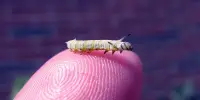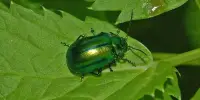Due to the climatic issue, the yellow-billed hornbill, a near cousin of the bird that inspired Zazu from The Lion King, is facing local extinction. Between 2008 and 2019, the population of the southern yellow-billed hornbill (Tockus leucomelas) in its native Kalahari Desert, Southern Africa, steadily declined, according to a new study published in the journal Frontiers in Ecology and Evolution. According to the researchers, its extinction is very definitely connected to rising temperatures throughout most of its native habitat.
The yellow-billed hornbill is a relative of the red-billed hornbill, which was portrayed by Rowan Atkinson in the 1994 Disney film The Lion King and by John Oliver in the 2019 remake. Birds are also thought to play an important part in the mythology and spirituality of various Southern African tribes. The species is distinguished by its peculiar breeding habits. The socially monogamous southern yellow-billed hornbill prefers long-term partnerships with a single individual. The male southern yellow-billed hornbill will stay with his partner and help to guard the nest once they have formed a bond and mated.
As the temperature continues to rise, this breeding approach is becoming increasingly difficult. The researchers discovered that the average proportion of occupied nest boxes decreased from 52 percent to 12 percent during the first three seasons of 2008 and 2011 and the final three seasons of 2016 and 2019.
The average number of chicks produced per breeding effort dropped from 1.1 to 0.4, while the number of successful breeding attempts dropped from 58 percent to 17 percent. According to the experts, this is significantly linked to rising temperatures in the area as a result of climate change. There were no successful breeding efforts when temperatures reached 35.7°C (96.26°F). It was also obvious that unsuccessful breeding attempts were proportional to the number of days when air temperatures exceeded a certain threshold.
If this trend continues, southern yellow-billed hornbills will be rare in many regions of Southern Africa by the end of the decade. In a statement, Dr. Nicholas Pattinson, principal author of the study from the University of Cape Town, stated, “Much of the public impression of the impacts of the climate problem is tied to scenarios projected for 2050 and beyond.” “However, the impacts of the climate problem exist here, and they can materialize not just during our lifetimes, but even within a decade.” “Despite no large-scale die-offs, we project that southern yellow-billed hornbills will be extinct from the warmest portions of their range by 2027,” says the research.














